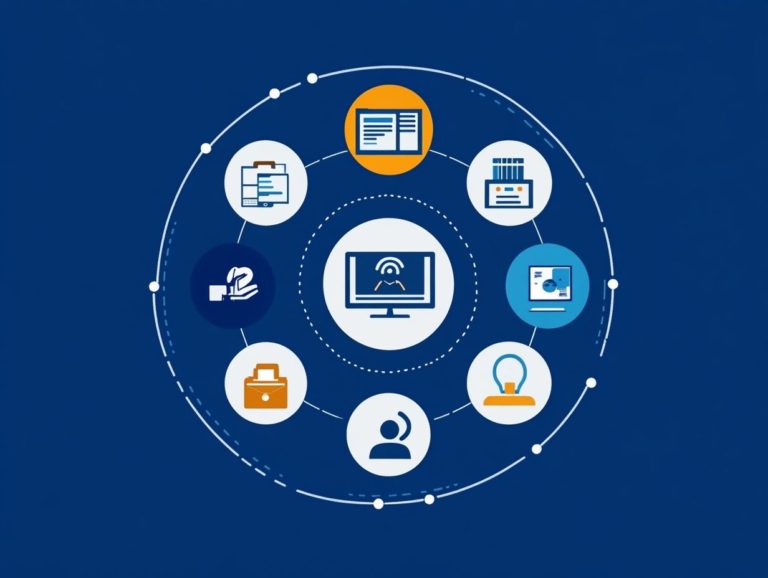Integrating CRMs with Cloud Storage Solutions
In today s fast-paced business landscape, managing customer relationships and data effectively is essential for your success.
This article delves into the synergy between Customer Relationship Management (CRM) systems and cloud storage solutions. It defines both CRMs and cloud storage, outlining the benefits of their integration which makes it easy to access and organize important information. You’ll also find a step-by-step guide on how to integrate them seamlessly.
Key considerations, such as compatibility and security, are addressed, along with a rundown of the top options available in the market. Discover how this powerful combination can elevate your business!
Contents
Key Takeaways:

Streamline your data management by integrating CRMs with cloud storage solutions!
Improve collaboration and accessibility by allowing team members to work together seamlessly and access data from anywhere.
Consider compatibility and security factors before integrating CRMs with cloud storage, and explore top solutions such as Salesforce and Google Drive for their features and pricing. Additionally, leveraging CRM integrations for better insights can enhance your overall strategy.
Understanding CRMs and Cloud Storage Solutions
Grasping the details of Customer Relationship Management (CRM) systems and cloud storage solutions is vital for any organization aiming to refine its processes and elevate its data management capabilities.
CRMs serve as robust software tools that empower businesses to effectively manage customer interactions, automate sales workflows, and extract valuable insights to enhance marketing strategies.
When these systems seamlessly connect with cloud storage solutions, organizations offer more flexibility, security, and room to grow, facilitating superior data handling and collaboration among teams.
The relationship between CRM and cloud technology is key. It can profoundly influence an organization s performance and drive growth.
Benefits of Integrating CRMs with Cloud Storage
Integrating CRMs with cloud storage solutions presents a wealth of advantages that can markedly elevate your organization’s operational efficiency and effectiveness, especially when utilizing the best CRM solutions with advanced integrations.
By streamlining data management, you gain improved accessibility and heightened security, equipping your team with the essential tools needed to refine and optimize your sales and marketing strategies.
This integration empowers you to work smarter, not harder.
Streamlining Data Management

Streamlining your data management by integrating CRMs with cloud storage solutions enables you to automate workflows and refine your data handling processes. By using CRM integrations to drive sales growth, valuable customer insights become readily accessible, allowing you to leverage them to elevate your sales and marketing strategies.
By harnessing these technologies, you can eliminate those tedious manual entries, cutting down on errors and ensuring that your information remains accurate and up-to-date. Cloud storage systems provide enhanced security features, protecting sensitive customer data from potential breaches.
With improved accessibility, your teams can collaborate more effectively, accessing vital information from anywhere, ultimately fostering a more agile work environment.
In the end, these integrations empower you to make informed decisions more swiftly, aligning your operations closely with customer needs and prevailing market trends.
Ready to transform your business? Start integrating your CRM with cloud storage solutions today!
Improving Collaboration and Accessibility
Integrating CRMs with cloud storage solutions can significantly elevate collaboration for your team within the organization. For insights on the top CRMs for seamless integrations, having real-time access to critical data allows you and your team to work together more effectively, no matter where you are.
This seamless connection allows you to share insights and updates instantly, leading to quick decision-making. You can easily track customer interactions, project timelines, and task assignments without the delays often encountered in traditional systems.
By leveraging platforms like Salesforce or HubSpot integrated with cloud services, collaboration becomes simpler and more transparent. Such integration ensures that every team member has the right tools to contribute to projects, fostering a sense of unity and shared purpose.
With this integration, your organization will see improved results and customer satisfaction through enhanced teamwork.
How to Integrate CRMs with Cloud Storage
Integrating CRMs with cloud storage demands careful planning and a clear approach to guarantee successful implementation and optimal utilization of technology, such as understanding the process of integrating CRMs with ERP systems.
This guide provides key tips and tools you need for effective integration, ensuring that your organization can harness the full potential of both systems seamlessly.
Step-by-Step Guide

To integrate CRMs with cloud storage successfully, follow these key steps tailored to meet your specific needs and objectives, including understanding the evolution of CRM and its integrations.
Start with a comprehensive assessment of your systems to identify gaps and pinpoint the features most critical to your operations. This evaluation sets the stage for selecting cloud storage solutions that integrate seamlessly with your existing CRM architecture.
When it comes time to choose a provider, be sure to weigh factors such as scalability, security, and customer support, as these elements can significantly influence your user experience.
Performing thorough compatibility checks will help you sidestep potential integration hiccups, ensuring that your CRM and cloud storage work in perfect harmony, facilitating smoother data management and enhancing overall efficiency.
Considerations Before Integrating
Before you embark on integrating CRMs and cloud storage solutions, it s essential to weigh several factors that can significantly impact the success of your initiative.
Pay close attention to ensuring compatibility between systems, assessing any potential security risks, and thoroughly evaluating the features offered by prospective providers. Each of these elements plays a crucial role in crafting a seamless and effective integration strategy.
Compatibility and Security
Compatibility and security are paramount when you integrate CRMs with cloud storage solutions, as they can significantly impact data integrity and user experience.
You must ensure that your systems are compatible to avoid any disruptions, while also implementing robust security measures to protect sensitive information.
In today’s digital landscape, the interplay between these components becomes even more crucial. When you’re considering the integration of these platforms, the ability to share data seamlessly while safeguarding it against potential breaches is essential.
Any misalignment or vulnerabilities can lead to unauthorized access, data loss, or compliance issues, jeopardizing both operational efficiency and client trust.
By implementing strong methods to keep your data safe and regularly updating your systems, you can mitigate these risks, allowing you to focus on leveraging your CRM solutions effectively.
By prioritizing both compatibility and security, you enhance your data management processes and strengthen your overall strategy for customer engagement.
Top CRMs and Cloud Storage Solutions for Integration

When you contemplate integrating CRMs with cloud storage solutions, it’s essential to delve into streamlining your workflow with CRM integrations, examining their features and pricing.
A meticulous comparison of these solutions will empower you to choose the ideal match for your unique needs and budget.
Features and Pricing Comparison
A thorough features and pricing comparison is crucial when choosing the best Customer Relationship Management (CRM) and cloud storage solutions for integration. This helps you meet your data and customer relationship needs.
By carefully examining various options, you can pinpoint solutions that offer easy integration that fit well with your current processes. For example, some CRMs come equipped with smart automation tools that simplify customer interactions while keeping expenses in check.
Meanwhile, cloud storage offerings can differ significantly in scalability and security factors vital for any business handling sensitive customer information. Grasping these nuances allows you to assess the overall value and ensures you invest in tools that will boost efficiency and foster collaboration across your teams.
Top Providers and Their Offerings
It s important to evaluate the top CRM and cloud storage providers when making informed decisions about your integration strategies.
Each provider brings unique features designed to meet various user needs, making it crucial to compare their offerings. Take Salesforce, for example; it really shines with its robust analytics and automation tools, giving you the power to enhance customer relationships effectively.
On the other hand, HubSpot offers a user-friendly interface and inbound marketing tools that particularly attract startups and smaller firms.
Regarding cloud storage, platforms like Google Drive provide seamless collaboration capabilities along with extensive integrations, making them perfect for teams spread across different locations.
In contrast, Dropbox focuses on advanced file-sharing features and security protocols, catering to enterprises that prioritize data protection.
Understanding these distinct offerings can guide you in selecting the right solutions that align with your operational goals.
Frequently Asked Questions
- What is the benefit of integrating CRMs with cloud storage solutions?
Integrating CRMs with cloud storage allows for seamless data storage and accessibility, making it easier to track and manage customer information. This integration also increases collaboration and productivity among team members. - Which CRM systems are compatible with cloud storage solutions?
Many popular CRMs, such as Salesforce, HubSpot, and Zoho, offer integrations with various cloud storage solutions like Google Drive, Dropbox, and OneDrive. It s best to check with your specific CRM provider for a list of compatible cloud storage solutions. - How does integrating CRMs with cloud storage solutions improve data security?
Integrating CRMs with cloud storage ensures that all customer data is stored in a secure and encrypted environment. This eliminates the risk of data loss due to hardware failure or cyber attacks, providing a more reliable and secure solution for storing sensitive information. - Can integrating CRMs with cloud storage solutions be customized for specific business needs?
Yes, many CRM and cloud storage providers offer customizable integration options to fit the unique needs of a business. This can include selecting specific data to sync, implementing automation processes, and setting up permissions for data access. - Are there any drawbacks to integrating CRMs with cloud storage solutions?
One potential drawback of integrating CRMs with cloud storage solutions is the cost. Some providers may charge additional fees for this integration, so it s essential to consider the budget and potential ROI before moving forward. - How can I get started with integrating my CRM with a cloud storage solution?
The first step is to research and select a CRM and cloud storage solution that best fits your business needs. Once you have chosen the providers, you can usually find step-by-step instructions or contact customer support for assistance with setting up the integration.






